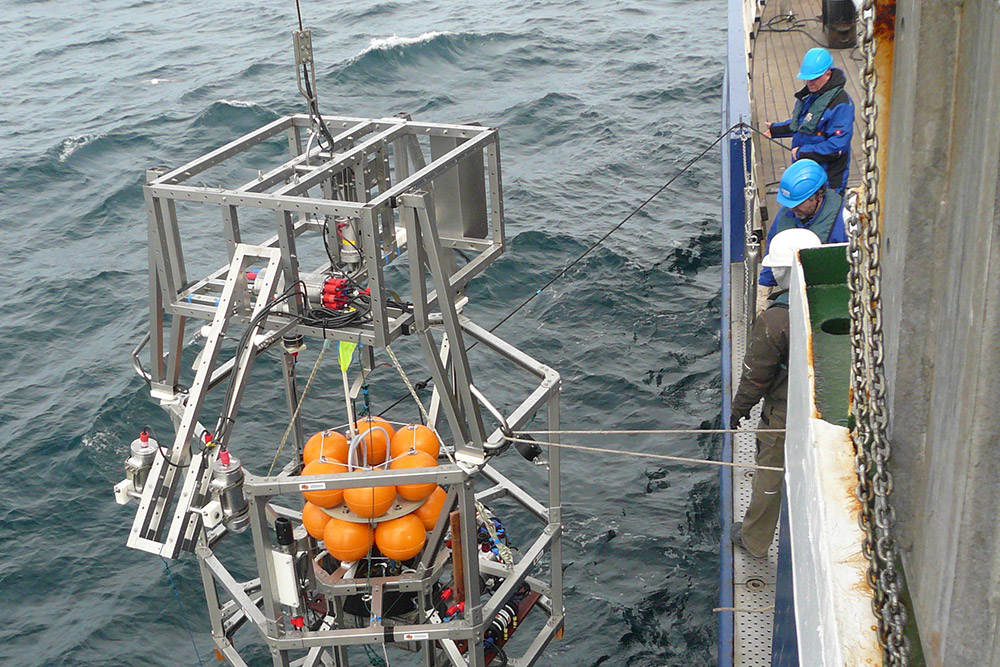Underwater test facility enters operation
Ocean Technology Campus Rostock clears another important hurdle: Fraunhofer IGD starts work at Digital Ocean Lab, an underwater test facility for marine technology in the Baltic Sea.

The signing of an agreement between the Mecklenburg-Vorpommern State Research Institute for Agriculture and Fisheries (LFA) and the Fraunhofer Institute for Computer Graphics Research IGD has made it official – the Digital Ocean Lab is in business! Fraunhofer IGD has received authorization to proceed with a series of underwater tests in the fisheries conservation area around the artificial reef off the coast of Nienhagen and on the associated research platform. This is the first stage in the expansion of the underwater test facility, to which further areas will be added in the future. The Rostock-based research institute is playing a significant role in the development of the Ocean Technology Campus (OTC) and, together with the University of Rostock and other partners, was recently awarded the status of Zukunftscluster (Future Cluster), which brings with it funding from the Federal Ministry of Education amounting to millions of euros. The collaborative relationship with the state research institute, which from now on will be subject to contractual regulation, means that the first experiments can gradually start at the test facility – for Fraunhofer’s own research or for that done by external partners.
The artificial reef off Nienhagen was created 18 years ago for the purpose of investigating various issues in fisheries and marine research in a real-world environment and not just in the laboratory. “It was obvious to us that these already existing structures would be ideal for technical tests that go beyond fisheries and marine biology,” explains Gerd-Michael Arndt, Director of the Institute for Fisheries at the LFA. “We are tapping into synergies and working together to find completely new solutions to the urgent challenges that modern society is faced with.” The LFA and Fraunhofer IGD intend to collaborate on various marine research projects, the first of which will investigate mariculture under the aegis of the Future Cluster. The first priority, however, is to upgrade the technical equipment of the adjoining platform. The new collaborative partners have offered firm assurance to locals and visitors to Nienhagen that nothing will change in the way things have looked up to now. Improvement of the broadband connection and the power supply are planned – small-scale technical details that are all the more crucial in persuading technology providers and research institutions to choose the underwater laboratory as a place to carry out their test series.
Digital Ocean Lab Director Dr. Peter Menzel thinks it shouldn’t be too difficult to persuade them: “What we offer in terms of possibilities with the Digital Ocean Lab is quite unique. Anyone who wants to validate their research or test their technology – underwater vehicles, measuring systems, cameras – or new materials and corrosion or fouling protection systems under real conditions will find a suitable place to do so here. Furthermore, we will also provide scientific support and advice on the most suitable stress tests, sensor technology or data evaluation. Environmental compatibility also plays a major role. We draw up individual test scenarios according to need and are thereby helping to advance technological marine research.” There are already underwater test facilities in Norway and Canada, but they operate within the fields of aquaculture and military development and thus have a completely different focus. Professor Uwe Freiherr von Lukas, Director of Fraunhofer IGD in Rostock and one of the initiators of the OTC: “What we want to achieve with the Digital Ocean Lab and at the Ocean Technology Campus in general is the development of the latest marine technology solutions to make the use of the oceans as efficient and ecologically compatible as possible in the future.”
But before things can really get started at the underwater test lab, the key issue of safety has to be addressed. All Fraunhofer employees who work on the platform and on the water receive comprehensive safety training. The same applies to all external users. The platform itself is also thoroughly checked for its safety features and retrofitted as necessary. As soon as the green light is also given in terms of occupational safety, Fraunhofer’s own Smart Ocean Technologies research group will be among the first users at the test facility. The ten-strong team is currently working on a project aimed at automatically measuring microplastic concentration in the world’s oceans. To this end, probes are being dropped in the Baltic Sea, while hardware and software is being developed and tested for detection and analysis. In the future, up to 25 scientists will be working as an interdisciplinary team on future-oriented marine technology at Rostock’s fishing port. To build up the personnel structures for the research work at Digital Ocean Lab, the German federal government already approved eight million euros in project funding back in 2018, and the state of Mecklenburg-Vorpommern has since approved a further five million euros. During the collaborative phase, which is expected to last two years, the LFA will continue as operator of the area around the artificial reef, while the state of Mecklenburg-Western Pomerania will remain the owner. Afterwards, it is planned to transfer the structures and rights of use to Fraunhofer IGD.
 Fraunhofer Institute for Computer Graphics Research IGD
Fraunhofer Institute for Computer Graphics Research IGD